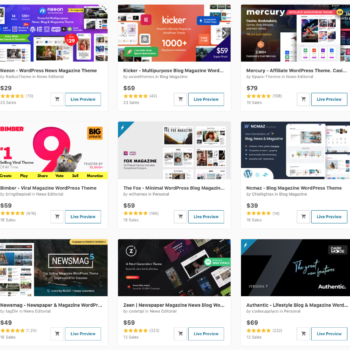Who This Comprehensive Blogging Guide is For:
This guide is designed to empower individuals at every stage of their blogging journey, providing valuable insights and actionable strategies:
- Aspiring Bloggers: If you’re new to the blogging world and curious about what it takes to get started, this guide will walk you through the fundamentals, helping you understand the core concepts, choose the right tools, and overcome initial challenges.
- New Bloggers: If you’ve recently launched your blog but are still finding your footing, this guide will offer best practices for creating engaging content, promoting your blog, building an audience, and establishing your online presence. We’ll delve into strategies for optimizing your blog for search engines, crafting compelling headlines, and developing a consistent posting schedule.
- Established Bloggers: If you’re a seasoned blogger looking to take your blog to the next level, this guide will provide you with advanced tactics to expand your reach, increase your blog traffic, and monetize your content. We’ll explore strategies like guest blogging, email marketing, paid advertising, and building a strong brand.
- Content Creators: Whether you’re a writer, photographer, videographer, podcaster, or any other type of creative professional, this guide will help you leverage your talents and expertise through blogging. We’ll discuss how to repurpose your existing content, build a loyal following, and create a platform to showcase your work.
In short, if you have a story to tell, knowledge to share, or a passion to express, this guide is for you. Blogging is a powerful tool for connecting with others, building a community, and making a meaningful impact. Let’s dive in and explore the exciting world of blogging together!
Why Start a Blog in 2024? The Benefits of Blogging
In today’s digital age, blogging offers a plethora of advantages for individuals and businesses alike. Whether you’re looking to share your passion, connect with others, establish authority, or generate income, blogging provides a versatile platform to achieve your goals.
1. Unleash Your Creativity and Self-Expression:
Blogging is a powerful tool for sharing your unique voice and perspective with the world. Whether you’re passionate about travel, food, fashion, technology, personal development, or any other topic, a blog allows you to express your thoughts, opinions, and experiences in a creative and engaging way.
2. Forge Meaningful Connections and Build Community:
Blogging isn’t just about broadcasting your ideas; it’s about fostering conversations and building relationships with like-minded individuals. By creating valuable content that resonates with your target audience, you can attract readers who share your interests and create a vibrant community around your blog.
3. Establish Yourself as a Thought Leader and Gain Credibility:
By consistently sharing insightful and informative content, you can position yourself as an expert in your niche. Blogging allows you to showcase your knowledge, skills, and experience, building credibility and trust with your audience. This can lead to new opportunities, such as speaking engagements, consulting gigs, or collaborations with other brands.
4. Unlock Diverse Income Streams:
Blogging offers a multitude of ways to monetize your content and generate income. You can partner with brands for sponsored posts, promote products or services through affiliate marketing, sell digital products like e-books or online courses, or even offer consulting services to your audience.
5. Elevate Your Personal Brand and Online Presence:
A well-maintained blog can significantly boost your personal brand and online visibility. By showcasing your expertise and unique personality, you can attract potential employers, clients, or collaborators. A strong online presence can open doors to exciting opportunities and career advancements.
In 2024, blogging is more relevant than ever. With the rise of social media, video platforms, and other digital channels, there are countless ways to promote your blog and reach a wider audience.
Whether you’re a hobbyist blogger or a professional content creator, blogging can be a rewarding and fulfilling endeavor. By sharing your passion, connecting with others, and establishing yourself as an authority, you can make a real impact in your niche and beyond.
The Fundamentals of Blogging: A Step-by-Step Guide to Building Your Online Home
1. Finding Your Blogging Niche: The Cornerstone of Your Blog’s Success
- Uncover Your Passions and Expertise: What topics ignite your enthusiasm? What knowledge or skills can you share with others? Your passion will fuel your blog’s content and keep you motivated in the long run.
- Identify Your Target Audience: Who are you writing for? Defining your ideal reader helps you tailor your content to their interests, needs, and pain points. This targeted approach attracts and retains a loyal following.
- Research Competition and Demand: Analyze the existing blogs in your niche. What are they doing well? Where are the gaps you can fill? Identifying your unique angle will help you stand out in a crowded field. Use keyword research tools like Google Keyword Planner or SEMrush to gauge the popularity of your chosen niche and identify relevant keywords to incorporate into your content.
2. Choosing the Right Blogging Platform: Your Blog’s Digital Home
- WordPress.org: The gold standard for bloggers, offering unparalleled flexibility, customization, and a vast library of plugins to enhance your blog’s functionality. It’s self-hosted, meaning you have full control over your website and data.
- Blogger: A free and beginner-friendly platform perfect for casual bloggers who want a simple interface and don’t require extensive customization. However, it offers limited features compared to WordPress.
- Squarespace: An all-in-one platform with stunning templates and built-in hosting. It’s a great choice for visually-oriented bloggers who prioritize design and ease of use.
- Other Platforms: Explore options like Wix, Medium, Ghost, and others to find the platform that best aligns with your needs and budget. Consider factors like ease of use, customization options, pricing, and features when making your decision.
3. Building Your Blog’s Foundation: Setting Up for Success
- Selecting a Domain Name: Your domain name is your blog’s online address. Choose a name that is memorable, easy to spell, relevant to your niche, and available for registration.
- Choosing a Web Host: Your web host stores your blog’s files and makes them accessible to visitors online. Choose a reliable host with fast loading times, excellent uptime, and helpful customer support. Popular options include Bluehost, SiteGround, and HostGator.
- Designing Your Blog: Select a visually appealing and user-friendly theme or template that aligns with your brand and niche. Ensure your design is responsive, meaning it adapts to different screen sizes for optimal viewing on mobile devices.
- Setting Up Essential Plugins (WordPress): If you choose WordPress, leverage plugins to enhance your blog’s functionality. Must-have plugins include Yoast SEO (for search engine optimization), Wordfence (for security), UpdraftPlus (for backups), and social sharing plugins.
4. Crafting Compelling Blog Content: The Heart of Your Blog
- Developing a Content Strategy: Map out your blog’s direction by creating a content calendar that outlines topics, publication dates, and promotional strategies. Set SMART (Specific, Measurable, Achievable, Relevant, Time-bound) goals to track your progress.
- Writing Engaging Blog Posts: Hook your readers with captivating headlines, use a conversational tone, and break up your text with visuals, headings, and subheadings. Focus on providing valuable information, solving problems, or entertaining your audience.
- Exploring Different Blog Post Formats: Diversify your content to keep your audience engaged. Experiment with how-to guides, listicles, opinion pieces, interviews, reviews, case studies, and personal stories.
- SEO Optimization: Integrate relevant keywords naturally into your content, titles, and meta descriptions to improve your blog’s visibility in search engine results. Use internal linking to connect related posts and guide readers through your site.
5. Promoting Your Blog and Growing Your Audience: Spreading the Word
- Social Media Marketing: Share your blog posts on social platforms like Facebook, Twitter, Instagram, Pinterest, and LinkedIn. Engage with your audience, join relevant groups, and participate in conversations to increase your reach.
- Blogger Outreach: Connect with other bloggers in your niche, offer to guest post on their blogs, and collaborate on projects to cross-promote each other’s work.
- Search Engine Optimization (SEO): Learn and implement SEO best practices to improve your blog’s ranking in search results. This includes on-page optimization (keywords, meta tags, etc.) and off-page optimization (link building, social signals).
- Email Marketing: Build an email list by offering a lead magnet (like a free e-book or checklist) and send regular newsletters to nurture your subscribers and keep them engaged with your content.
Frequently Asked Questions (FAQs) About Blogging
Blogging can raise a lot of questions, especially for those just starting. Here are answers to some of the most common questions:
- How do I find blog topic ideas that resonate with my audience?
- Know your audience: What are their interests, pain points, and questions? Conduct surveys, engage on social media, or analyze comments to gather insights.
- Keyword research: Use tools like Google Keyword Planner or SEMrush to discover trending topics and keywords relevant to your niche. Look for long-tail keywords (longer, more specific phrases) with decent search volume and lower competition.
- Competitor analysis: Check out successful blogs in your niche and see what topics they’re covering. Can you offer a fresh perspective or more in-depth information?
- Brainstorming and mind mapping: Jot down ideas as they come to you, or use mind mapping to visually connect related topics.
- Follow trends and news: Stay up-to-date with the latest developments in your industry or niche and share your insights.
- How often should I publish new content on my blog?
- Consistency is key: Establish a realistic publishing schedule and stick to it. Whether it’s once a week, twice a month, or daily, the most important factor is to publish regularly.
- Quality over quantity: Don’t sacrifice quality for the sake of frequency. It’s better to publish one well-researched, in-depth post than several rushed, mediocre ones.
- Experiment to find your rhythm: Start with a schedule you can manage and adjust it based on your bandwidth and audience engagement.
- Consider your niche and goals: Some niches require more frequent updates than others. If you’re aiming for quick growth, more frequent posting might be beneficial.
- What are the most effective ways to monetize a blog?
- Display advertising: Partner with ad networks like Google AdSense to display ads on your blog. Earnings depend on traffic and ad clicks.
- Affiliate marketing: Promote products or services relevant to your niche and earn a commission on sales made through your unique affiliate links.
- Sponsored content: Partner with brands to create sponsored posts or reviews in exchange for payment.
- Digital products: Sell e-books, online courses, templates, or other digital products related to your expertise.
- Services: Offer consulting, coaching, or freelance services to your audience.
- Memberships and subscriptions: Create exclusive content or a community for paying members.
- How can I get more traffic to my blog and increase my readership?
- Search engine optimization (SEO): Optimize your blog posts for relevant keywords, create high-quality content, and build backlinks to improve your search engine rankings.
- Social media promotion: Share your blog posts on social platforms, engage with your followers, and participate in relevant groups and communities.
- Content marketing: Create valuable content that attracts and engages your target audience.
- Guest blogging: Write guest posts for other blogs in your niche to reach a wider audience and build backlinks.
- Email marketing: Build an email list and send regular newsletters to promote your content and keep your audience engaged.
- Paid advertising: Consider investing in social media ads or search engine marketing to reach a larger audience.
- What are the essential tools and resources every blogger should use?
- Content management system (CMS): WordPress is the most popular choice for its flexibility and customization options.
- Keyword research tool: Google Keyword Planner or SEMrush can help you find relevant keywords to target.
- SEO plugin: Yoast SEO or All in One SEO Pack can help you optimize your blog posts for search engines.
- Analytics tool: Google Analytics helps you track your blog’s traffic, user behavior, and conversions.
- Email marketing service: Mailchimp, ConvertKit, or Constant Contact can help you build and manage your email list.
- Social media management tool: Hootsuite or Buffer can help you schedule and manage your social media posts.
- Grammar and spell checker: Grammarly or ProWritingAid can help you improve your writing.
- Image editing software: Canva or Adobe Photoshop can help you create visually appealing graphics.
Advanced Blogging Strategies for Growth and Success
Once you’ve mastered the fundamentals, it’s time to implement advanced strategies that will propel your blog to new heights. Here are some proven tactics to expand your reach, boost engagement, and achieve sustainable growth:
1. Guest Blogging and Building Relationships with Other Bloggers:
- Expand Your Reach: Guest blogging on established blogs in your niche exposes your work to a new audience and drives traffic back to your own site.
- Build Credibility: Writing for reputable platforms establishes you as an authority in your field and strengthens your online reputation.
- Network with Influencers: Connecting with other bloggers opens doors to collaborations, partnerships, and valuable learning opportunities.
- Boost SEO: Backlinks from high-authority websites can significantly improve your blog’s search engine rankings.
2. Creating and Nurturing an Email List: Your Direct Line to Readers
- Direct Communication: An email list allows you to communicate directly with your audience, bypassing the algorithms of social media platforms.
- Increased Engagement: Send targeted newsletters with exclusive content, promotions, or updates to keep your subscribers engaged and returning to your blog.
- Build Loyalty: Nurturing relationships with your email subscribers can turn them into loyal fans and customers.
- Monetization Potential: Promote your products, services, or affiliate offers directly to your most interested readers.
3. Leveraging Paid Advertising for Targeted Reach
- Reach New Audiences: Paid advertising on platforms like Facebook, Instagram, or Google Ads can introduce your blog to a broader audience beyond your existing reach.
- Precise Targeting: Target your ads based on demographics, interests, and behaviors to reach the most relevant potential readers.
- Boost Specific Posts or Campaigns: Use paid ads to amplify the reach of specific blog posts, product launches, or seasonal promotions.
- Retargeting: Show ads to users who have previously visited your blog to re-engage them and encourage them to return.
4. Analyzing Blog Performance with Data and Analytics
- Google Analytics: Track your blog’s traffic, user behavior, and conversions to gain valuable insights into what’s working and what’s not.
- Identify Top-Performing Content: See which posts are most popular, attracting the most traffic, and generating the most engagement.
- Optimize Your Strategy: Use data to refine your content strategy, improve user experience, and make data-driven decisions.
- Track Conversions: Measure the success of your monetization efforts by tracking sales, sign-ups, or other desired actions.
5. Building a Strong Author Brand and Online Presence
- Develop a Unique Voice: Craft a distinct writing style that reflects your personality and resonates with your audience.
- Be Authentic: Share your personal stories, experiences, and opinions to connect with your readers on a deeper level.
- Be Consistent: Maintain a regular posting schedule and consistent brand messaging across all platforms.
- Engage with Your Audience: Respond to comments, participate in discussions, and build relationships with your readers.
- Expand Your Online Presence: Create profiles on social media platforms, contribute to online communities, and network with other professionals in your field.
By implementing these advanced strategies, you can transform your blog into a thriving online platform that generates traffic, engagement, and ultimately, success. Remember, blogging is a marathon, not a sprint. Stay committed, experiment with different approaches, and continuously learn and evolve to achieve your blogging goals.
Your Blogging Journey Begins – Everything You Need to Know and More
Embarking on a blogging journey is an exciting adventure filled with endless possibilities. Whether you’re seeking a creative outlet, a platform for self-expression, a way to connect with others, or a means to generate income, blogging offers a dynamic and rewarding path.
This comprehensive guide has equipped you with everything you need to know about blogging – from the fundamentals of choosing a niche and platform to advanced strategies for growth and monetization. By understanding the core principles, utilizing effective tactics, and consistently creating valuable content, you can build a thriving blog that truly makes a difference.
Your Blogging Adventure Starts Now! Seize the Opportunity
Don’t hesitate to take that first step. Whether you’re starting a personal blog to share your thoughts and experiences or a professional blog to establish your expertise, the world of blogging is open to you. Remember, the most successful blogs are built on passion, consistency, and a commitment to providing value to your audience.
Embrace the challenges, learn from your mistakes, and never stop experimenting. The blogging landscape is constantly evolving, and there’s always something new to discover. By staying curious, adaptable, and dedicated to your craft, you can create a blog that not only resonates with your readers but also achieves your personal and professional goals.
So, what are you waiting for? Unleash your creativity, share your knowledge, and connect with the world through the power of blogging. Your blogging adventure awaits!









People reacted to this story.
Show comments Hide comments[…] Everything About Blogging: The Ultimate Guide to Starting and Succeeding in 2024: This comprehensive guide will walk you through every aspect of starting a blog, from finding your niche to promoting your content and monetizing your efforts. It’s your one-stop shop for blogging success. […]